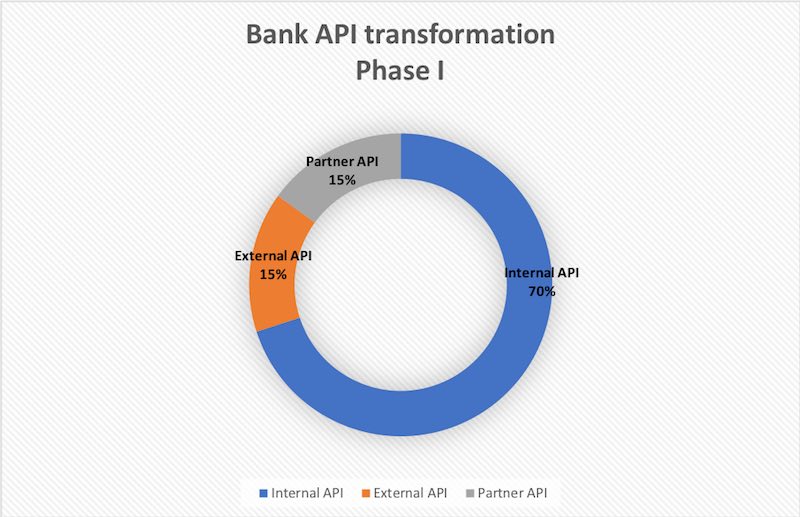Banks should steal the 2002 Bezos internal memo
Dear Banks,
It only takes an internal memo to ignite your own Bezos moment.
Five clear and crystal commandments[1] (“good artists borrow, great artists steal”)
that you can steal from Jeff B.:
1
All teams will henceforth expose their data and functionality through service interfaces.
2
Teams must communicate with each other through these interfaces
3
There will be no other form of inter-process communication allowed: no direct linking, no direct reads of another team’s data store, no shared-memory model, no back-doors whatsoever. The only communication allowed is via service interface calls over the network.
4
It doesn’t matter what technology they use. –(tech neutral)
5
All service interfaces, without exception, must be designed from the ground up to be externalizable. That is to say, the team must plan and design to be able to expose the interface to developers in the outside world. No except
Bezos ended his 2002 now famous mandate with a chilling little twist:
“Anyone who doesn’t do this will be fired. Thank you; have a nice day!”
Just 17 years later, you can feel free – I would say you should feel inclined to do so – and steal this. You can end your internal memo with a kinder twist:
“Anyone who doesn’t do this will no longer be with the team. Thank you; have a nice day!”
2019 in Finsev
I am using `Banking` to refer to financial institutions that have traditionally been in the business of serving retail, institutional, and corporate clients across all the spectrum of their needs. The Banking business model has been a PUSH operating model and the opaqueness and regulatory barriers to entry have allowed them to morph into a predominantly product business.
I celebrated this past March, 4yrs with Daily Fintech., during which I have been writing every single week on global innovations in Capital markets, wealth and Asset management[2].
I can safely say by now, that the only sustainable banking model is a PULL operating model that at its core becomes a platform as a service business. Much like Bezos transformed Amazon from a digital bookseller business, into a platform as a service.
For this to happen, the core transformation needed is in the `middle office` (conventional parlance) via APIs. Unless banks realize this, they will become suicidal and victims of a `lemming effect`. Their herd behavior to keep up with digitizing the `front office` to improve their customers` experience and even their engagement; will prove futile. The reason being, that as long as the culture remains that of selling products eventually; banks will find themselves in a commoditized business with margin going to zero.
“Any bank that does not transform its `middle office` via APIs; will become extinct. Thank you; have a nice day!”
The good news about this transformation is that it has lots of possibilities and variations. But a bank has to start its platformification process, first internally.
Think first Private APIs that enable each and every department to access data and workflows in real time. Then, one can think of Public APIs, Partner APIs, and the Οpen Banking obligation or opportunity. Banking transformation needs to look more like 2/3 internal APIs in the first phase.

Chris Skinner and Jim Marous, have been preaching relentlessly about these issues. But it seems that it is difficult to convince `Doubting Thomas`[3]. There is no reliable data (to my knowledge) on this topic that is essential, despite the fact that it may seem a `detail`. The devil always hides in the details.
Over the past 3yrs, I have been monitoring the Financial APIs from the Programmable Web and there is clearly an increase. From 2016 to date, we have gone from 1700+ to 3800+ financial APIs. Of course, there is no quality differentiation or usage stats with this doubling. And none of these stats, are related to the paramount internal transformation measured by Private or Internal APIs, and their usage.

The one piece of evidence that I can share with you, is from Goldman Sachs. Marquee [4], is the GS sophisticated freemium platform for its institutional clients, which I have used as a great example of `Empowering Asset Owners and the Buy Side` WealthTech Book, 2018 Wiley.
Adam Korn, who has spearheaded the project of giving out Marquee for free, reported late last year that:
` After months of work, Marquee now fields more than 100 million API calls each month, about 5 million of which come from outside Goldman’s four walls. Marquee now has roughly 12,000 monthly active users, split evenly between internal and external clients. And the number of users is beginning to increase, according to Korn.`

It only takes an internal memo to ignite your own Bezos moment.
[1] The API Manifesto Success Story
https://www.profocustechnology.com/enterprise/api-manifesto-success-story/
[2] https://dailyfintech.com/author/efipylarinou/
[3] A doubting Thomas is a skeptic who refuses to believe without direct personal experience—a reference to the Apostle Thomas, who refused to believe that the resurrected Jesus had appeared to the ten other apostles, until he could see and feel the wounds received by Jesus on the cross. https://en.wikipedia.org/wiki/Doubting_Thomas
[4] Named in honor of CIO R. Martin Chavez, known by everyone as “Marty”.
I have no positions or commercial relationships with the companies or people mentioned. I am not receiving compensation for this post.

